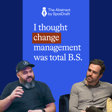
Expanding Beyond the GC Role | Bonus Episode
Interested in expanding beyond the traditional role of General Counsel?
Join us in this episode to find out how legal leaders redefine their roles. Discover insights that transform legal professionals into strategic business leaders – from smoothly transitioning to CEO to mastering adaptive communication in enterprise strategy.
Read detailed summary: https://www.spotdraft.com/podcast/episode-23
Topics:
Introduction: 00:00
Evan Ferl on taking the legal landscape beyond its limits: 01:16
René Paula on enterprise strategy and adaptive communication: 06:55
Kathy Zhu on mastering the legal to CEO transition: 09:11
Vanessa Gage on navigating interim leadership challenges: 12:15
Genessa Stout on mastering legal insight and business success: 17:19
Outro: 20:30
Subscribe now for valuable perspectives on Google Podcasts/Apple Podcasts/Spotify.
Tyler Finn - https://www.linkedin.com/in/tylerhfinn
SpotDraft - https://www.linkedin.com/company/spotdraft
Featured guests:
Evan Ferl: https://www.linkedin.com/in/evanferl/
René Paula: https://www.linkedin.com/in/rpaula/
Kathy Zhu: https://www.linkedin.com/in/kathymzhu88/
Vanessa Gage: https://www.linkedin.com/in/vgage/
Genessa Stout: https://www.linkedin.com/in/genessastout/
SpotDraft is a leading CLM platform that solves your end-to-end contract management issues. Visit https://www.spotdraft.com to learn more.



















